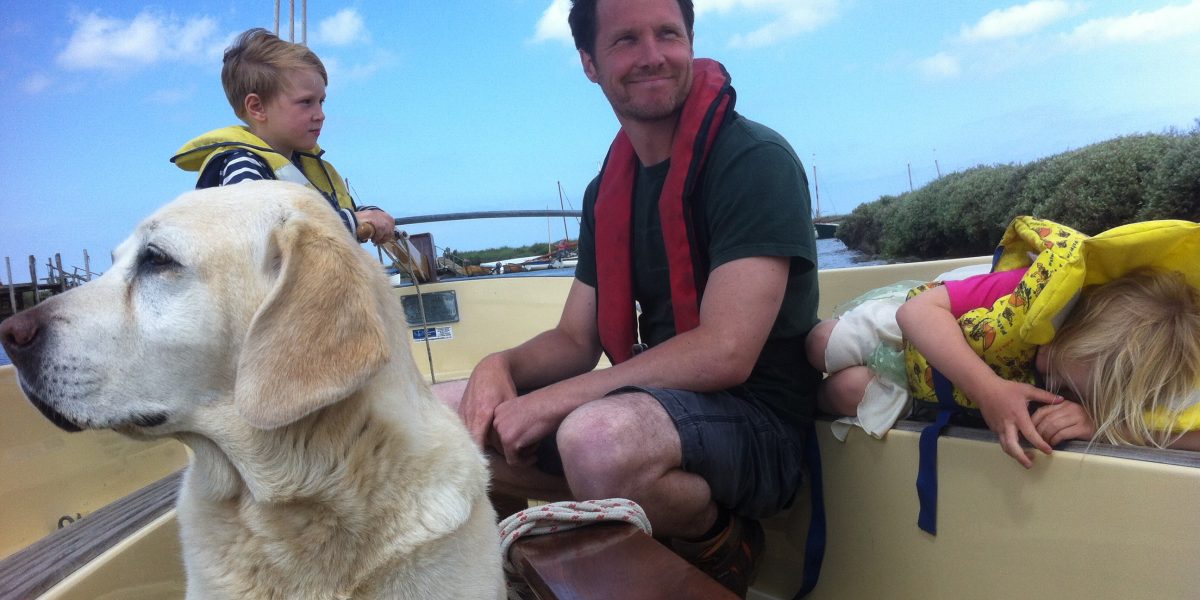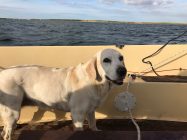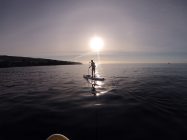“I Don’t want to go to work,” I complained, “It’s too nice here.” I was laying in our garden and enjoying the warmth of the sunshine. “I know,” Neil agreed, stretched out beside me on the giant beanbag. This was last Sunday, just after lunch. Early April was pretending to be mid-August and I wanted to play along. I looked over at Neil, his eyes closed, his face relaxed, his breathing deep and regular. This was the first time in a week that I’d had a chance to look at him, to be with him and I wanted to preserve this tranquility. I propped myself up on one elbow and looked down at him, “Okay. How about if we go now, work until five and then go for a sail?” He squinted up at me, his smile lazy, “That would be really nice. We should.” “Especially as it will probably snow next weekend. It being Easter and all.” Neil laughed and I knew the deal was sealed.
At work we uncovered the boats to be sold, listed their condition and equipment, took photographs and recovered them. The glorious weather made it a thoroughly pleasant afternoon. The children played on their bikes while Neil and I worked and our mood remained light in anticipation of our first family sail of the season. As we left the yard and drove the short distance to Morston, the thermometer on my car read 24.5 degrees centigrade and I began to doubt we’d need the jumpers and coats I’d packed in the boot. Even at Morston, as I opened the door and was enveloped in the thick salty sweet air blowing off the marsh, I had a moment of naivety and considered leaving all of the extra layers in the car. Luckily experience swept in and, as Neil walked ahead to ‘Annie’, I, the family porter, pulled everything from the car ‘just in case.’
I walked, laden with lifejackets and clothing, to ‘Annie’ with the children lagging behind and although the mud on the marsh was parched and cracked, I was amazed to find that, by the time she had reached ‘Annie’, a good five minutes after the rest of us, my dawdling daughter had managed to find the remnants of thick marsh sludge that the sun had failed to bake and her boots and legs were covered in it. Unfortunately I didn’t notice this until she’d climbed aboard and spread the mud all over the seats. I patiently explained to Grace that it was annoying that the boat, and we, were now covered with mud and asked her to remove her boots. She was apologetic and compliment so the mud was quickly forgotten. As Neil motored ‘Annie’ away from the pontoon mooring and Archie took the helm, navigating us up the creek, Grace and I moved to the bow of the boat where we were able to sit stretched out on the front locker, with the sun on our faces, the warm wind in our hair. We watched the land-lubbing world slip away and, just as I was wondering if this could get any better, Neil shouted forward to Grace and I that he wanted to try his new jib reefing system so we had to get out of the way. Typical, I thought as Grace and I moved to make space for the jib and managed to avoid the flapping jib sheets.
At the end of the creek the southerly breeze picked up and, although I’m not sure what it would have registered as on the Beaufort Scale, it was a stiff one. It was also a lot kinder than those bitter easterly’s that we’re normally blasted by. The warm fragrant winds meant the coats and jumpers continued to languish in the locker, unrequired. Neil explained to Archie that we were going to motor out into the harbour, put the boat into the wind and raise the sails. Archie did a great job at the helm while Neil hoisted the mainsail and Grace and I did our best to ignore the noise of the sails and ropes thrashing in the wind. “Right, it’s fairly lively out here,” Neil began, “So I’m going to put a couple of reefs in. I just need you, Chenda, to keep the boat pointed over there.” I followed the direction of Neil’s outstretched arm, and looked towards the marsh and land beyond, “Can you do that?” “Yes.” I sounded confident but was suddenly having an internal crisis. I wanted a gentle sail. I didn’t want ‘lively’. I wasn’t mentally prepared for ‘lively’ and for the sails, with their loud rustling and the sheets that flailed wildly against everything. I recalled a time I went for a ‘lively’ sail in a Cockle and a squall had careened through the pit. I had thought the boat was about to capsize as it skittered and heeled over, the gunwales dipping almost too far under the burbling water. As we had tacked to spill the wind I was slapped in the face by the main sheet. It had been too much. I had turned white and asked, very quietly, to be let off the boat.
On Sunday evening with those ropes and sails making all the noise; that fear flashed up again and I was completely unprepared for it. My hand slipped on the throttle of the outboard and we gave a small lurch forward. Neil glared as if to say, ‘What the hell?’ I panicked and quickly twisted the handle back so that the engine was just gently bubbling behind us. My palms were sweating and I couldn’t do it, I couldn’t keep the boat into the wind, there were too many moorings, too many boats, ‘Annie’ was starting to swing off the wind. “Neil! Neil, I can’t do it,” I shouted, “I can’t hold it into the wind. It won’t do it. I don’t know what to do.” “Yes, you do,” Neil called back calmly, still rolling the main sail up into the reefing position, completely unaware of my rising hysteria. “I can’t!” I shouted louder, making sure to be heard over the noise of the engine, “I can’t do it. It’s not working. It’s too dangerous. I don’t know what I’m doing. Help Neil! Help!” It might have been the last two SOS’s that alerted Neil, and the crew of the Oyster sailing past us, that something was not right with me.
“For God’s sake Richenda, get a grip,” Neil commanded as he abandoned the reefing of the sail and moved aft to take charge. “Are you okay?” the lovely man from the passing Oyster called out to us. “Yes!” “No!” Neil and I answered in unison. I saw Neil shrug and shake his head at the sailing couple and would be rescuers before he turned back to me, “The reason we are not staying into the wind is because you’ve not got enough power in the engine,” he sounded exasperated as I moved out of the way and he took over the throttle, “Here, run her at this speed and you’ll keep us into the wind.” The engine roared a little louder and the boat turned back into the wind, holding its course under Neil’s firm hand. “But I can’t do it,” I said doubtfully as the hysteria receded back to a manageable level of apprehension. “You. Can.” Neil said, “You know what to do. And you have to stop panicking. It’s dangerous to panic.” I bristled as I took control of the throttle from him, making sure not to adjust the power level, keeping the boat perfectly to the wind, “It isn’t me that dangerous, it’s you!” I argued, “I don’t know what to do and you didn’t give me clear instructions.” “I did Richenda. You panicked and that’s when accidents happen.” “I’m not a sailor!” I was indignant as I held the boat on course and Neil resumed reefing the main sail, “You know that. I don’t know what I’m doing and yet you think I do.” “See, what happened was you panicked,” Neil explained slowly, using the same tone he uses when explaining something complicated to the children, “And then you couldn’t think and..” “Too right I couldn’t think,” I interrupted, “The boat wouldn’t hold its position and there are boats and mooring buoys all around us. We were going to crash!” “Chenda,” Neil, now finished with the reefing, came and sat opposite me and took charge of the throttle again, “Look around, there are hardly any boats out here. Look at all this space. We were fine. Once you calmed down and began arguing with me, rather than freaking out, you did a good job.” I quietened down as I realised he was right.
“Can we sail round to Blakeney?” Archie asked, “And can we have tea at the pub and then sail back?” “Yes,” Neil and I agreed, the equilibrium restored. We congratulated Archie on his fine idea and calculated the time this would take. It was only when I tapped my pocket and felt the empty space where my purse should have been that I recalled it sitting in my car. I had left it behind because I had not thought that we’d need it. It’s not like there are any shops out on Blakeney Point or the marsh. There were collective grumbles of disappointment as I admitted my mistake to the family but we stuck to our plan and tacked to Blakeney Quay. Rather than stopping, we turned at the first corner of the quay and headed back to Morston. As the sun set over the water on the way home a chill began to nip at us and the jumpers and coats were retrieved from the locker and put to good use.
When we got back to the car park at Morston we saw a family friend and he asked if we’d had a nice sail. I told him we had, apart from my ‘moment’ and how it been witnessed by one of our customers, much to poor Neil’s embarrassment and my shame. He turned to Neil and said, “You’re not alone Neil. I have the same problem with my wife. I think we’ve been coming out here for years. She’s done this hundreds of times, she must know what she’s doing by now. Surely I won’t have to explain how to pick up a mooring again. But still she gets in a panic and gets it wrong, and we end up rowing. How, I think to myself? How is that possible?” Neil laughed and looked relieved that someone understood his frustration. And, although I rolled my eyes at them, it did feel good to know that if I was to chat to my friend’s wife about my moment of panic, she would sympathise, and not just about the panicking but about the shame and embarrassment that follows as you realise that you may have overreacted and done so publicly. And while I carry the burden of being hyper aware of how my actions on the water reflect on both Neil and I, and on the business, I guess we are lucky because we live and sail in Blakeney Harbour where almost every sailor out there has, at some point, either cocked something up and/or got in a muddle only for it to be witnessed by an audience of at least one local. So while this post might embarrass Neil and be my tale of shame, have I told you about the time I was a hero and rescued those people?




